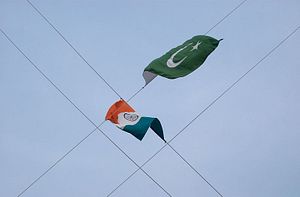Last week, the Royal United Services Institute (RUSI) published a report claiming that Pakistan’s military is seeking rapprochement with India. Given Pakistan and India’s complicated relationship and the domestic and international pressures that have always undermined the spirit of such initiatives, one should be careful about drawing any conclusions about a likely reconciliation between these historic foes. With all its limitations, however, given the fact that Pakistan’s powerful military is leading the reported initiative in an attempt to normalize ties with India, one can argue that the prospect for a solid peace between the two countries remains a real possibility.
The desire of the Pakistani military to reconcile with India comes before the backdrop of an understanding that the former has seldom preferred genuine peace with New Dehli. In fact, the military in Pakistan is known to have undermined many efforts by elected civilian governments in the country aimed at offering peace to India. One of the major lessons in this regard can be drawn from the Kargil debacle. In 1999, while prime ministers of India and Pakistan were meeting in Lahore, Pakistan’s military was executing the Kargil operation on the Indian side of Line of Control in Kashmir. The operation not only derailed the ongoing reconciliation process between the two countries elected governments but also came as a shock for both countries’ civilian governments as they were unaware of any such operation until it was underway. Another major effort on the part of Pakistan’s civilian government came in 2014 when the current Prime Minister of India, Narendra Modi, invited Pakistan’s former Minister Nawaz Sharif to his swearing-in ceremony. In December 2015, Modi landed in Lahore to drop in on celebrations of Sharif’s birthday and his daughter’s wedding. The initiative, which was aimed at laying ground work for some serious negotiations to take place, proved to be in vain as the military in Pakistan opposed Sharif’s ensuing proposals.
On the other hand, there is evidence to suggest that whenever the military in Pakistan has favored the normalization of ties with India, the result has been a success. The government of Pakistan’s former chief of the army staff, President Pervez Musharraf, undertook various initiatives to pave the way for the normalization of relations between India and Pakistan. The four-point initiative proposed by Musharraf, which had the military’s organizational support, included the phased demilitarization of Jammu and Kashmir, local self-governance, no change in Kashmir’s borders, and a joint supervision mechanism in Jammu and Kashmir involving India, Pakistan, and Kashmir. Musharraf’s proposal was also welcomed by India and reportedly the governments of both countries came very close to signing a historic deal that had the potential to establish peace between New Delhi and Islamabad. The initiative, however, couldn’t reach its proposed conclusion due to impending political instability in Pakistan that derailed Musharraf’s government and forced him to retire from his positions as army chief and president in 2007 and 2008 respectively. The initiative shows nonetheless that there remains a possibility for a lasting peace if the military in Pakistan supports the process.
That said, there are forces on both sides that do not wish to see peace under most circumstances. In Pakistan, the deeply embedded popular narrative of ‘India as enemy’ that feeds into a number of religious groups’ agendas and adds life to their political and ideological relevancy remains a challenge that needs to be addressed. Moreover, in Pakistan, there are forces that have been weaponized behind the state’s decades-long policy of casting India as a perpetual enemy that is interested in undoing Pakistan. Unless the Pakistani state works on reversing the widespread narrative of India hate, any peace efforts—even those supported by the military—will face a challenge.
In India, the issue of Pakistan is also considered a domestic political issue. There remains a domestic political challenge to any reconciliation efforts that New Delhi may undertake with Pakistan. Any frays between Hindu and Muslim communities in India have by and large been seen, discussed, and understood in the context of the subcontinent’s partition, which resulted in a secular, Hindu-majority India and Muslim Pakistan. In this context, an initiative to normalize ties with Pakistan carries a huge risk that can undermine any political party’s support base in India. Arguably, Prime Minister Modi’s current policy toward Pakistan is a result of growing domestic pressure to counter Pakistan’s alleged policy of undermining New Delhi’s security and political interests in the region.
Understandably, there is no dearth of “spoilers” eager for opportunities to inflame India-Pakistan relations and undermine reconciliation efforts. While it remains to be seen how India reacts to the Pakistani military’s new overtures, both states should keep a tight lid on forces that can undermine the initiative. The road to lasting peace between India and Pakistan will prove long and difficult, but it’s something that can only be achieved through sustainable and uninterrupted dialogue.

































